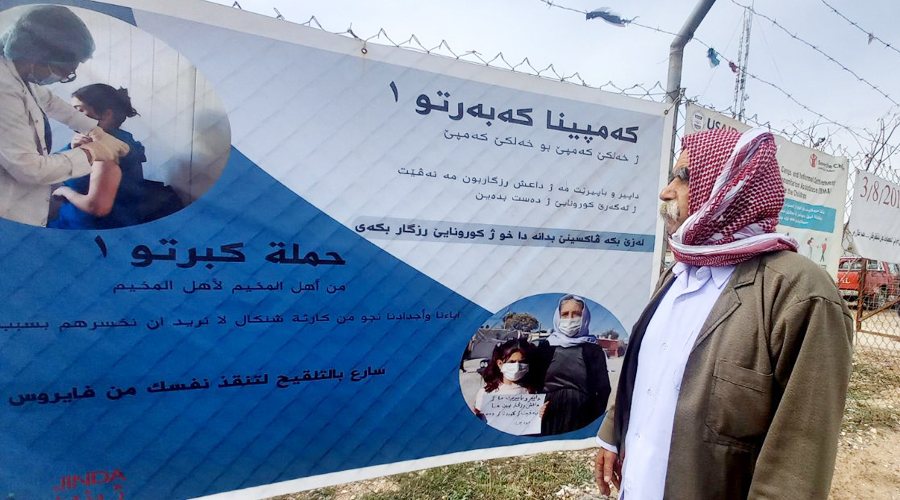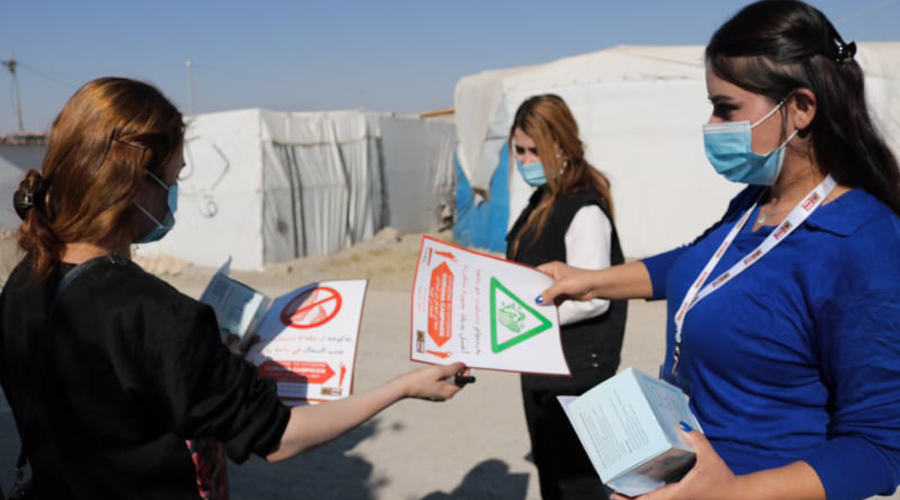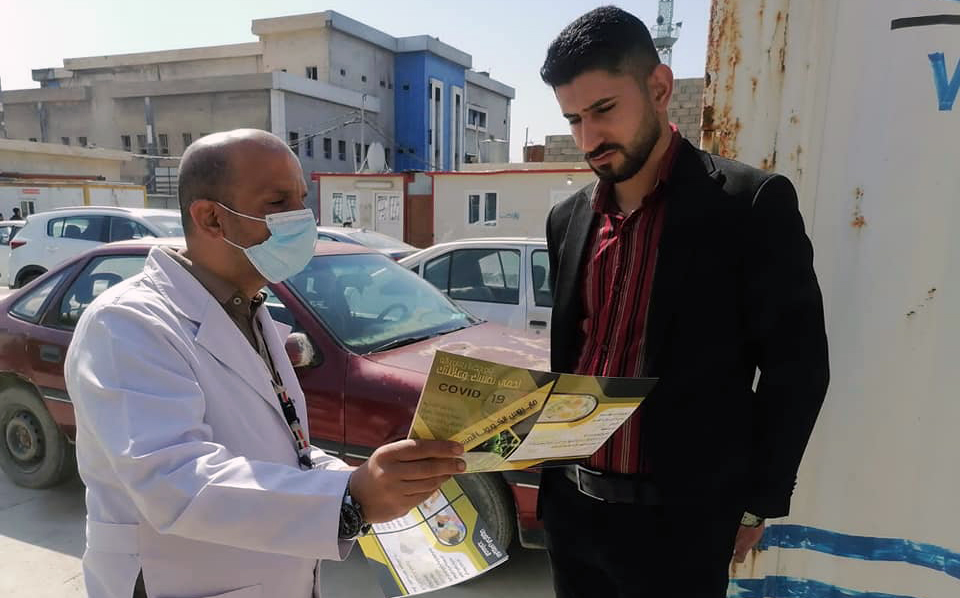Some local administrations in Iraq print and publish awareness posters to urge people to receive the Corona vaccine in Arabic only, the official language in Iraq, even in areas where religious and ethnic minorities constitute the majority of the population and have their own languages, but some civil society organizations are keen to publish these awareness posters in the six languages of the minorities.
Some members of government teams and non-governmental organizations NGOs speak with members of minorities in their local languages in the areas inhabited by minorities, in order to overcome lack of awareness posters in mother tongues.
Despite low records of infections, state campaigns are continuing. Iraqi ministry of health has registered about 600 positive cases on March 6, total 2.3 million cases since February 2021, for 25,000 deaths.
Iraq has joined the jab race last march when it has received 50,000 doses of Sinopharm vaccine as donation by China and up today almost 10 million Iraqis received the first and second dose of the Covid-19 vaccines.
Muhammad Ashraf, 45-years -old resident of the district of Tal Afar, 70 km northwest of Mosul, in the Nineveh Governorate, near the Iraqi-Syrian border, is one of dozens of Turkmen citizens who have seen posters written in Arabic and not in their mother tongue (Turkmen), but he sees that this does not represent a problem for him.
“Several volunteer teams and local organizations visited our area and spoke with us in the Turkmen language, calling on the residents to prevent the spread of Corona virus, and the importance of taking the vaccine,” Ashraf said
"Some of them provided leaflets containing health information. While others provided hygiene and sterilization supplies for families... they spoke to us in our language and the information they provided was clear," he added.
According to the estimates of the Iraqi Ministry of Planning for 2019, the population of Tal Afar is more than 524,000 people, the majority of the population of the district center is from the Turkmen component at district center, as well as Sunni Arabs and Yazidis in the outskirts.
The General Directorate of Nineveh Health, in the context of awareness campaigns, sent awareness posters to Tal Afar district, but all of them were written in Arabic.
KirkukNow visited the Relations and Information Unit in the health sector of Tal Afar, which in turn stressed that all posters and leaflets urging citizens to receive the vaccine are written in Arabic and sent to them by the General Directorate of Nineveh Health of the Iraqi Ministry of Health.
But to avoid the communication problem, Tal Afar health relies on teams of minority members who speak the language of the region's minorities in order to be able to explain the importance of vaccination simply and clearly.
Generally, public awareness posters are posted in hospitals and health centers.
The teams for awareness include members from local residents for ease of communication with the local communities in their mother tongue... We did not receive posters (posters) in the Turkmen language, given that the majority of the population in Tal Afar cannot read in the Turkmen language, even if everyone speaks it, according to the Relations and Information Unit of Tal Afar health office.
Turkmens are considered the third largest ethnic group in Iraq after Arabs and Kurds, residing almost exclusively in the northern towns and villages stretching from Tal Afar through Mosul, Erbil, Altun Kupri in Kirkuk, Tuz Khurmatu in Salahaddin, Kifri and Khanaqin of Diyala. They are mainly Muslims, half Sunnis and half Shiite.

Dohuk, March 2022: a displaced Ezidi(Yazidi) in Kabartw IDP camp looks at an awareness poster encouraging vaccination. Ammar Aziz
But Ali Ahmed, a civil activist in Tal Afar who works in a volunteer team to urge the people to receive the Corona vaccine, told KirkukNow, "Some of the residents of the region do not speak Arabic, especially those who did not attend school, so it is necessary to urge them to receive the vaccine in their mother tongue.”
Ali speaks in the Turkmen language with the Turkmen of Tal Afar, and says that it is important to deliver accurate information to the population.
Despite this, Ahmed says, “It is unfortunate that the publications we printed were in Arabic because, at the same time, many residents do not know how to read in the Turkmen language, whether it is in Arabic or Latin letters, even postgraduates, many of whom do not know how to read their mother tongue because they attended schools that teach in Arabic language.
In general, the presence of minority languages on the posters varies from one region to another, for example, the posters published in the Darkar camp for the displaced in Zakho district - near the Iraqi-Turkish border - and inhabited by the majority of Ezidis (Yazidis), are printed in both Arabic and Kurdish (Kurmanji dialect), as the Yazidis They speak and write in Kurmanji, but most of them are fluent in Arabic as well.
Nuri Said Darbo, a teacher in Darkar camp which houses 3,328 IDPs, said, "We understand the languages used in the posters well, but the publicity campaigns to urge people to receive the Corona vaccine are not widespread in general."
"The displaced are not like other citizens, because they are away from city centers, so double efforts must be made compared to city residents to encourage them to take the vaccine, because their living conditions made them not care much about the vaccine.”
Faisal Ali, an Ezidi (Yazidi) citizen who lives in Cham Mishko camp in Zakho district, home to 21,551 IDPs, thinks, "Urging IDPs through posters to take the vaccine is at its lowest level. Personally, I have not yet seen a poster that attracts my attention and motivates me to get the vaccine."
"Most of the displaced people I spoke with say that if you take the vaccine, you will die after a few years, or you will get various diseases, so the volunteer teams should clarify these matters to the displaced," said Ali.
In Dohuk governorate, 189,424 displaced people and refugees live in camps, according to the statistics of the Dohuk Health Directorate, 42,282 doses of the Corona vaccine were distributed until the end of last February among IDPs, some of them received one dose and others received both.
As of March 2, 2022, 467,410 doses of vaccine have been administered in Dohuk, according to statistics from the Iraqi Ministry of Health, out of a total of 1.6 million people, including the displaced and refugees.
Ezidism is an old Middle Eastern monotheistic ethnic religion and is based on belief in one God who created the world and entrusted it into the care of seven Holy Beings, known as Angels. The ouststanding among these angels is Melek Taus who is the leader and has authority over the world.
Most Ezidis speak Kurmanji, one of the two main Kurdish dialects, however, most Ezidis consider Ezidism a religious not ethnic identity.
Video: 10 facts about the Ezidism
About the lack of posters in the camps for the displaced, Hamza Muhammad, Information Officer of the Duhok Health Directorate, told KirkukNow, "We are in the process of a large project to educate citizens and urge them to receive the vaccine. The project is implemented at the level of the Ministry of Health of the KRG and consists of audio messages, posters, seminars and face-to-face dialogue with the displaced.”
“The target of the project is the displaced people residing in the camps and the refugees.”
About the start date of the project and the details related to it, Hamza Muhammad said, "The date for the implementation of the project has not yet been determined, but it will be launched as soon as possible."
Last year, a number of minority organizations, in cooperation with the United Nations UN, launched a campaign to distribute 17,000 awareness posters about Corona in various regions of nine Iraqi governorates, in the languages of six minorities and components living in those governorates.
The goal was to educate minority communities in Iraq in their own language
Amer Al-Mawla, Vice President of the Turkmen Rescue Foundation - whose organization is overseeing the campaign - said, "The goal was to educate minority communities in Iraq in their own language about the effects of the coronavirus, and to call for adherence to health preventive measures and the need for vaccination.”
The 17,000 posters have been translated into the languages of the six components and minorities, namely, Syriac (Christians), Avesta (Zoroastrians), Kurmanji (Yazidis), Mandaean (Sabean-Mandaeans), Turkmen (Turkmen), and Macho (Kaka'is), Al-Mawla explained.
The distribution of posters included areas inhabited by minorities in the governorates of Nineveh, Kirkuk, Diyala, Salah al-Din, Dohuk and other governorates.
The posters were distributed by volunteer teams from Christian civil society organizations (Itana Women Organization), Kakai (Mithra Organization for Yarsan Culture and Development), Sabean Mandaeans (Yardna Charity Organization), Turkmen (Turkmen Rescue Foundation), Yazidis (Yazda Organization), and Zoroastrianism (Organization Yesna for Philosophy and Zoroastrian Religion.
The Turkmens have seven seats in the Iraqi parliament, distributed over the governorates of Nineveh (in the Tal Afar district), Kirkuk, Salah al-Din (in Tuz Khurmatu district), Diyala and Baghdad.
But other minorities got their seats under the quota system within the framework of the electoral law, including Christians (5 seats) in Baghdad, Nineveh, Dohuk, Erbil and Kirkuk. As for the Shabak, the Sabean Mandaeans and the Faili Kurds, one seat was allocated to each of them (the Shabak and the Yazidis in Nineveh), the Faili Kurds in Wasit and the Sabean Mandaeans in Baghdad.
The Kakais and Zoroastrians do not have quota seats, but the Kakais succeeded in the recent parliamentary elections in winning two seats as part of their candidacy within the two leading Kurdish parties, Kurdistan Democratic Party KDP and the Patriotic Union of Kurdistan PUK.
Other minorities were able, in addition to the quota seats, to win additional seats within the framework of the parties made it to the house of representatives such as the Yazidis.
“In addition to spreading key messages about COVID-19, the awareness campaign has had a mutually reinforcing effect of raising awareness of minority languages spoken in Iraq among diverse communities, including those who are not familiar with the languages,” Al-Mawla said.
“In total, the campaign reached 67 neighborhoods and 12 remote villages in 25 districts across nine governorates that had not previously received awareness materials in their mother tongues.”

According to Al-Mawla, the campaign was carried out by 121 volunteers (70 men and 51 women) distributed posters in schools, hospitals, police stations, places of worship and public spaces.
In Nineveh Governorate, 754,679 doses of the Corona vaccine were distributed among four million population until March 2.
WADI, a Germany-based and funded organization, supports a local partner called Zhinda to educate the displaced in the Dohuk camps for IDPs about the importance of vaccination.
A team of four Ezidi girls from Zinda organization met with displaced people in Khanki camp, majority Ezidis, to enlighten them in their mother tongue, beside distribution of leaflets and awareness posters.
Aya Jalal, projects coordinator of Zinda Organization, said, "We visit the camp daily, encouraging the displaced to receive vaccinations in various ways, through dialogue and giving information, or hanging educational and awareness posters in the camp."
"Our goal is for the largest number of displaced people to receive the vaccine, and we feel that we have achieved this goal," Aya Jalal noted, adding that "30 people per day receive the vaccine."
Wadi organization has taken it upon itself to print the posters in Arabic and aims to transfer its campaign to other camps.
A member of the Wadi organization team reveals information about the campaign
According to the statistics of the Joint Crisis Coordination Center of the Ministry of Interior of the KRG, there are more than 664,000 displaced people in the Kurdistan Region, some of them are residing in 26 camps, 16 of it located in Dohuk.
The Yazidis constitute 30% of the total displaced people in the Kurdistan Region, 7% are Christians and 10% are from other minorities, and the rest are Kurds and Sunni Arabs.
In Khanke camp, in which the Zinda team is active, there are 14,123 IDPs, 2705 families.
Muhammad Karim, a displaced person from Shingal (Sinjar) district who lives in Kabartw camp in Dohuk, said, “I think that what has been done for the displaced is not enough, for example, there is a vaccination center in our camp, but there are people in the camp who do not know that the Corona vaccine is administered in that center."
"We would like these posters to be hung in the camp in a language we can understand, and it would be better if they were in the Sinjari dialect for everyone to understand," he added.





